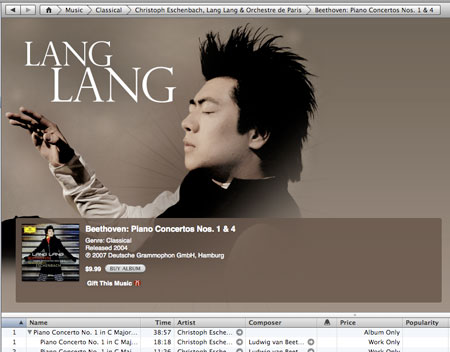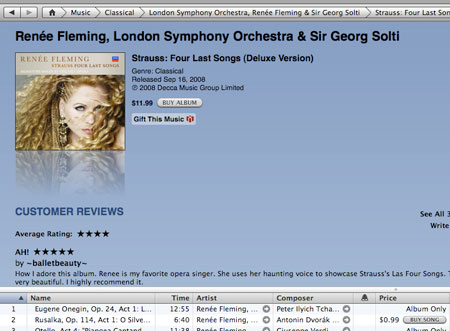Monday is the new black/Friday. Each week, I’ll post an interview with a special person far more knowledgeable than myself on specific marketing and publicity subjects. This week, label New Media Manager Denise McGovern on pitching placement, digital-only releases and what we’re going to do when the record stores close for good.
 Denise McGovern is the New Media Manager at Universal Music Classical/Decca Label Group. She is responsible for digital sales to accounts such as iTunes, Rhapsody and Napster.
Denise McGovern is the New Media Manager at Universal Music Classical/Decca Label Group. She is responsible for digital sales to accounts such as iTunes, Rhapsody and Napster.
How long have you been at Universal?
Five years.
How has your job changed along with the technology since you started?
I started working in marketing (when marketing meant simply booking ads), but I had come from an online classical music site so I kept interjecting ideas about email marketing and banner ads into the mix. Right about that time iTunes launched, and they needed someone Stateside to look after how our music was featured there. It soon became a full-time job and now I’m in charge of most of our digital music accounts.
Which digital music platforms does Universal service?
We’re just about everywhere – from iTunes, Rhapsody and Napster to mobile OTA providers and new deals like MySpace Music.
Are certain platforms ever given exclusives? Pre-“street” date releases? Who initiates those kinds of deals, Universal or iTunes/Rhapsody/etc.?
Yes, we do provide exclusives. Sometimes that means a window of time where they are the only place where that album is available (like a pre-release exclusive) and sometimes it means bonus content (like an extra track, a video or an artist interview).
Who initiates the deal usually varies depending on the project. In many cases, I know what kind of content is available so I’ll offer it up to see what kind of interest there is. In other cases, the artist is of such interest to the account that they will ask if there’s something special we can do with the new release.
Obviously, good placement on iTunes is extremely important for album sales. How is placement on the main page, the main page of the genre section, etc. decided? Is it pitched like a story is pitched, or bought like an ad?
It’s pitched like a story. And just like a publication, there are layers of editors/programmers. The entire team looks at what’s available that week and programs based on what they think will be of the most interest to their users and what will sell the best.
What iTunes placement is considered The Placement Holy Grail? What’s the best placement you’ve ever gotten for an album, and what kinds of sales resulted?
For classical, the Holy Grail is to be considered on the same level as a pop album. I’d say that’s positioning on the first page and a descriptive page about the record with art that really gets the audience interested in that release. But it’s not an exact science. Sometimes you get that Holy Grail and it turns out to just be a cup – at the end of the day, the release has to be interesting and connect with the people who see it.
I’d say there are a few placements that were pretty spectacular. Lang Lang’s Beethoven release in particular had a banner on the main page right next to Tim McGraw and 50 Cent. The combination of many things (within and outside of iTunes) made that record have a stellar first week with over half of the scans coming from digital.
But talking about placement, you have to realize that all of this positioning comes down to conversations and relationships with people over there. That one week shot of fantastic placement usually takes weeks of talks with different people and having folks on the iTunes side really carry your flag. It’s very much a team effort on both sides of the game.
Some iTunes pages look ridiculously nice and designed,
 and others look normal:
and others look normal:
 Again, is that something artists/record labels can pay for, or does iTunes just decide which albums get special aesthetic treatment and which don’t?
Again, is that something artists/record labels can pay for, or does iTunes just decide which albums get special aesthetic treatment and which don’t?
They absolutely decide themselves and no one buys anything. We provide them with the publicity shots and any art available and their designers go to work. It’s an iTunes editorial decision.
Do you feel increased pressure to sell albums digitally every time another record store closes?
I feel increased pressure to make sure that the digital accounts do the best that they can and sell what’s best for their audience. When we first started selling digitally, people really saw this as a marketing tool rather than a sales vehicle. More exposure than sales. As time has gone on, you don’t get a pat on the head for the exposure. The sales figures are really looked at. But I’d say that since I’ve started doing this, we’ve learned what works for each account, and we’ve learned what titles can do strong digital figures. This is true of any sales vehicle or publicity outlet – if you know your market and your audience, you can make things a success in that particular outlet, even if it’s not the expected.
Was it exciting when Deutsche Grammophon’s digital-only La Philharmonic recording debuted at number 1 on the Billboard classical chart a few months back? Do you think that will encourage/has encouraged labels toward producing more digital-only releases?
It was incredibly exciting! We had been working on the DG Concerts program for awhile, and the very first one would have charted if the rules were different. Then Billboard changed the rules and digital-only releases were now eligible. It was only the second week after the rule change that the concert hit #1. It was so gratifying for all of us who had been working in the digital space to see these products on the chart.
Labels were already looking at digital-only releases, but this certainly gave digital-only releases legitimacy. The charts are a stamp of approval. You don’t see marketing copy that says “The #1 Classical Album if Only Digital Albums Could Chart!”
Let’s say I’m an artist and I’m going it alone: I have no manager, no publicist, no marketing team and no record label, but I’ve worked very hard on recording and self-producing my own album. How do I even begin to place it digitally?
There are a number of digital aggregators that help independents get their music on to digital services. That makes the music available. After that, it’s just marketing — generating interest through your website, emails, publicity hits and live appearances.
Worst thing to happen to the record industry in the past five years?
Enhanced CD products like SACD – there was so much time spent for so little adoption.
Best thing to happen to the record industry in the past five years?
More and more music online through discovery and retail services – from iMeem to iTunes. You have no idea how many albums I’ve purchased from artists I had never heard of a year ago. Or passed on purchasing super-hyped albums because they truly sucked.
